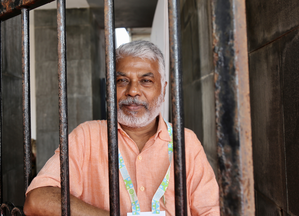New Delhi: It is an unusual interaction. You ask the questions, and two kind people, who know Tamil, translate them for him. He answers in his native tongue, and his replies come back in English. While this delicate ballet takes place, Perumal Murugan never takes his eyes off you. Is he even blinking? It is unnerving. He is perhaps looking inside you.
Long back, he had once asked you, “Isn’t life, but memories?” Maybe he will say something today too that will refuse to leave.
Murugan, who has to his credit twelve novels, six collections of short stories, six anthologies of poetry, and several non-fiction books, with ten of his novels translated into English and is a recipient of the JCB Prize for Literature among several others, starts the conversation with loneliness.
He says it is not a bad thing. For him, it has always been extremely important.
“How will writing happen if there are too many sounds? Internal isolation magnetises words. They start coming easy. The mind willingly travels lands far and wide and looks for stories. Melancholy has a strange charm. It is only when alone that you are truly yourself,” he tells IANS on the sidelines of the ongoing Kerala Literature Festival (KLF), Asia’s largest literature festival being held at Kozhikode Beach.
Currently working on a new set of short stories to be published soon, the author is working on the theme of how pets affect human lives and their affairs.
Exploring their connection with men, he adds, “I come from an agricultural family which had lots of goats, cows, and bullocks. In those times, they helped us in their work. Now, with youngsters going abroad for work, pets serve a different purpose for their parents. They depend on them for company now… a one-way dialogue. It is tragic but see, they (animals) are in so many ways more relevant to our lives in present times”
A staunch Marxist, Murugan, despite all the failings of Indian communists politically, continues to stay true to the essence of communism.
“Politics is only one aspect of Marxism. It does not matter how relevant they are in terms of vote share. Look at the contribution of the ideology to literature and the arts, how it has been instrumental in making so many of us sensitive towards everything around us.”
The author who hit international headlines post the book ‘One Part Woman’, published in 2010 and translated into English in 2013 faced a lawsuit filed against him by caste-based groups accusing him of hurting their religious sentiments, and he declared on his Facebook page: “Perumal Murugan the writer is dead. As he is no God, he is not going to resurrect himself. He also has no faith in rebirth. An ordinary teacher, he will live as P. Murugan. Leave him alone.”
However, in 2015, the Madras High Court dismissed the case against him. In an epilogue, the bench called on the author to start writing again: “Let the author be resurrected to what he is best at. Write.”
Remembering that time, Murugan says that the judge was not just supporting him but also freedom of expression.
“But there is still an invisible fear… of books being banned, of freedom of expression curtailed. Democracy must prevail, under all circumstances.”
For someone who has been translated widely, and published in English by Penguin and HarperCollins India, it is not just about the fact that the translator is proficient in both languages.
“He/she needs to understand the intricacies of the village dialects too. The metaphors of the country life can be tough to put in words in another language,” he concludes.
–IANS/


Comments are closed.